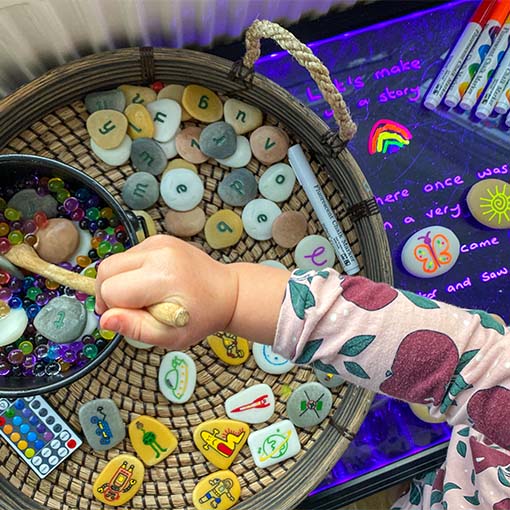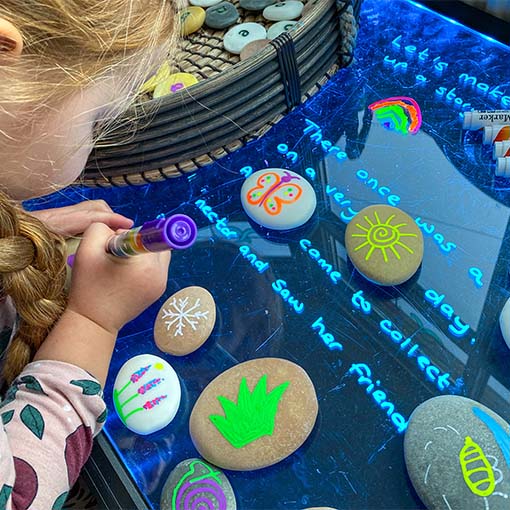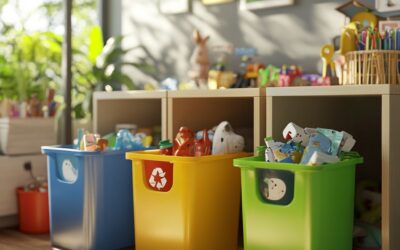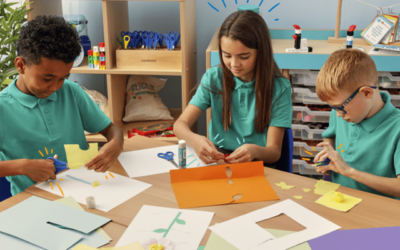Sensory Stories – encouraging literacy in early years play
Sensory Stories – encouraging literacy in early years play
We worked with our Brand Rep, @Mamasden, to explore Sensory Stories, and how they help to incorporate and encourage literacy in early years play.
Have you ever noticed how children just cannot keep still for long periods of time? This is totally normal for children as they like to be active learners seeking out new experiences and is brilliant for children to develop sensory and motor skills. Leave a child an invitation to learn and play and they will be drawn into areas or use the resources you provide to adapt into their own games.
As early years practitioners or even as parents we often have curricular in mind but we must be mindful that children develop at their own pace and with their own interests and ideas. Following your child’s interests is key. Create fun and inviting areas in your home or childcare setting and learning will follow.
Stories are fantastic to use in both quiet time and active play. Have you ever been to the woods and retold stories about bears or mystical creatures and stood back and watched as children splash in puddles or join in with familiar story phrases? Natural curiosity is ever present and I like to use story stones as a way of encouraging children to play in groups or to create their own tales.
Communication and Language, Personal, Social and Emotional Development, Literacy, Understanding of the world and expressive art and design can all be focused upon when creating stories with children and resources can be used and manipulated to suit the ages and stages of children. However opportunity for all areas of the Early Years Foundation Stage (EYFS) can be reflected in literacy play.
Sensory Stories Soup
Stories can easily be included in lots of sensory and inclusive play ideas. One of our
favourite activities is creating sensory story soup. Here we used Story stones, alphabet pebbles and water beads in a sensory soup. We pick out a stone and use the picture to then either create a sentence or build the word into our stories. Using a set of stones which is important to the children i.e. a current topic they are learning about or an interest will secure knowledge and give the children the opportunity to share their current knowledge and learn more fun facts in a creative and curious way.
Activity Ideas
- Word build using the alphabet pebbles
- Create your own story stones using the natural pebbles and chalk pens
- Write a sentence and fill the blanks with homemade story stones.
- Use a glow panel to add an extra sensory learning element into literacy. Children can easily draw on the panel and then rub out and re create time and again.
- Create a sensory story soup which could include pre-printed story stones, loose parts and alphabet pebbles.
Literacy in Action
- Letter stones to practice phonetical awareness
- Story Stones to enhance vocabulary
- Phonic Sounds are demonstrated by caregiver
- Story telling will give children more fluency to their speech
- Comprehension is improved as a child understands more of what the read or are told
- Blank stones are used to mark make or write on
What you should consider when planning your activity.
Intent – Why are you doing the activity?
Implementation – How do you intend to carry out the activity and what do you need to make it successful for all the children?
Impact – What went well and how could you change things next time?
Think of an activity as a who, what, where, when scenario and encourage Awe and Wonder into all that you do.
By Jennifer Wooldridge from @mamasden
Jennifer is a registered childminder and has worked with children in this role since 2011. The experienced childminder provides an exciting and nurturing space for children to play and learn in. She uses her secure knowledge of child development to plan a curriculum that ignites children’s interests and challenges their curiosity.
If you’ve enjoyed this article, why not have a read of some more expert advice and opinions relating to all things early years?


Related blogs
What Goes In, Must Go Out
Creating a Circular Economy in Your Nursery Author: Nick Corlett Sustainability Manager at LEYF Sustainability is more than a trend—it’s a shared responsibility, and the nursery is the perfect place to nurture these skills. Every day...
Top tips to create a SEND-Friendly Primary School Classroom
Author Lindsay Robinson Lindsay Robinson has been a primary school teacher for 23 years and is passionate about achieving the very best outcomes for children through quality first teaching and experiences. I remember receiving very little guidance during my teacher...
Celebrating being part of a Global Community
Author: Alice Sharp As a young teacher I can remember how much time and effort went into looking at the SHAP Calender. This is a calendar of festivals around the world. We had to try and ensure we celebrated anything relevant but also introduce other festivals from...


